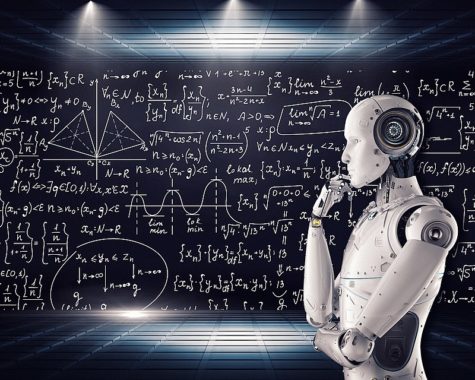AI may be the Future, but will it be a good one?
From ChatGPT to Deepfakes: Is AI good or bad for society?
October 5, 2023
Recently, it may seem like AI is everywhere; in the news, on social media, and even in the classroom with the use of Chat-GPT to cheat. Artificial Intelligence has, in seemingly the span of a single year, rapidly developed from the stuff of far future sci-fi into something real and in the hands of the masses.
Programs such as Midjourney, the aforementioned ChatGPT, VoiceLab, and countless others are creating images, writing, and imitating voices. Large companies such as Google, Ubisoft, Khan Academy and Microsoft are also investing their efforts in the technology. AI may seem like the next revolutionary invention that uplifts humanity, but many are concerned with how AI will impact society as a whole.

The technology is impressive, but many are asking if AI could replace entire industries and leave people out of jobs, or if it could fake videos to an unprecedented degree. While AI is not at that level yet, the technology is improving at an exponential rate, and the already existing social impacts of AI have been worrying enough.
AI voice cloning has recently been used by phone scammers to scam people using the voices of their loved ones. The scam, which the FTC has already issued a warning over, only requires as little as a three second voice clip to replicate the voice of someone else. But this is only the beginning of the potential for AI disinformation.
AI that creates images or videos of things that never happened, also known as deep fakes, is already spine chillingly close to reality. One of the most recent examples of this was an image of Pope Francis in fashionable clothing that spread around the internet. The image is eerily convincing and is impossible to tell apart from a regular photograph save for the Pope’s extreme attire; not only do the shadows and reflection of light on the Pope’s face look real, but every detail of his face is present on the AI doctored image.
It becomes worse when one realizes that deepfakes have more uses than jokes on the internet, and will influence politics both globally and domestically. Donald Trump has already been both the victim and perpetrator of AI generated images on the internet. Multiple AI generated images were spread this month displaying Trump being arrested, while the former President took to the internet to post an AI generated image of himself, on his knees, praying.
While these images are much less convincing, and can be easily determined to be AI generated, they set a worrying precedent for the use of deepfakes and doctored images in politics. It becomes worse, however, with the existence of AI generated videos and speech. While the technology to create AI generated videos is not as far ahead as voice and photo generation, there are already plenty of examples of it on the internet.
One video fakes Biden reinstating the selective services act and drafting 20 year olds to war in Ukraine. While the video is still identifiable as a fake (President Biden’s movements are uncannily stiff and his mouth moves a bit too much), it looks real enough where there may be no difference to the untrained eye. If AI gets any better at replicating video, then the news, both online and traditional, will undoubtedly be destroyed. For so long, video has been verifiable pr. The potential fallout of Deepfakes is practically ensuring that video and audio recording becomes useless as an invention, making anything not seen with your own two eyes completely unidentifiable as truth or a lie.
Another concern regarding AI is its impact on people’s livelihoods, especially careers involving artistic expression or typing, such as authors, programmers, and digital artists. AI has already been developed for creating digital art, and despite its current roughness, AI is always improving. Many are concerned that if AI grows to a point where it can create art on par with humanity, then human-made art might die out. Not only would human artists be replaced because computer programs are cheaper and faster than a human, but even online spaces where human art flourishes could be flooded with AI posts.
However, some argue that human artists are not seeing the bigger picture, and that AI will not take away the jobs of artists, coders, and writers, and will instead just alter how they work. Game developer Ubisoft, for example, is using an AI ghostwriter to speed up the workflow of their writers. Proponents of AI like to point out the fact that some tend to know how to prompt AI better than others, however the usage of AI is so disconnected from the product that is created that it becomes concerning how little humanity is involved in the art. Plus, with the inherent nature of the technology, some jobs, especially lower level ones taken by amateurs are going to be replaced.
Ultimately, AI art makes one question: whether Art is about the journey or the destination. Is art defined by how pretty it is, or is art defined by the experiences of the person who made it? Is there no value in how we transcribe our brains to a screen or the page, or is how we say something just as, if not more important than what is being said?
Researchers have already found that writing and thinking are closely intertwined processes, and it is well known that the process of creating art gives people joy. Creating art can lower stress, put artists in a better mood, and allows them to express their emotions. There is already tons of art out there to see, so why does art need to be churned and pumped out faster if it leads to the loss of human involvement and passion?
AI ultimately is not like the industrial revolution before it, which automated the production of necessities such as textiles and transportation, as it only seeks to automate what humans love to do and what does not need to be automated. There is also the concern of plagiarism in AI image generation, as AI is trained off of human made art already. This also leads to problems as AI inherits humanity’s biases and prejudices and could be influenced negatively based on the data used to train it.
Ultimately, the potential uses of AI are worse than the few positives. Sure, AI could be used by hospitals to help detect disease, and chatbots could help people learn and could improve mental health, but AI is far better at spreading disinformation, taking jobs from humans, and replacing them in creative efforts. At the end of the day, while robots are the ones who might automate everything, humans will be the ones who will have to deal with them.
Citations:
Fazackerley, A. (2023, March 19). AI makes plagiarism harder to detect, argue academics – in paper written by chatbot. The Guardian. Retrieved April 13, 2023, from https://www.theguardian.com/technology/2023/mar/19/ai-makes-plagiarism-harder-to-detect-argue-academics-in-paper-written-by-chatbot
Cerullo, M. (2023, March 21). Scammers are using AI Voice Cloning Tools to dupe victims. MSN. Retrieved April 13, 2023, from https://www.msn.com/en-us/money/personalfinance/scammers-are-using-ai-voice-cloning-tools-to-dupe-victims/ar-AA18UDxX
Humphries, M. (2023, March 22). Ubisoft is using AI to write dialogue for video game characters. PCMAG. Retrieved April 13, 2023, from https://www.pcmag.com/news/ubisoft-is-using-ai-to-write-dialogue-for-video-game-characters
Pichai, S. (2023, February 6). An important next step on our AI journey. Google. Retrieved April 13, 2023, from https://blog.google/technology/ai/bard-google-ai-search-updates/
Khan Academy Writers. (n.d.). Khanmigo Education AI Guide. Khan Academy. Retrieved April 13, 2023, from https://www.khanacademy.org/khan-labs
Sharma, S. (2023, March 24). Trump shares deepfake photo of himself praying as AI images of arrest Spread online. The Independent. Retrieved April 13, 2023, from https://www.independent.co.uk/news/world/americas/us-politics/donald-trump-ai-praying-photo-b2307178.html
Bond, S. (2023, March 23). It takes a few dollars and 8 minutes to create a deepfake. and that’s only the start. NPR. Retrieved April 13, 2023, from https://www.npr.org/2023/03/23/1165146797/it-takes-a-few-dollars-and-8-minutes-to-create-a-deepfake-and-thats-only-the-sta
Tewari, G. (2022, November 8). Council post: Recent advancements in artificial intelligence. Forbes. Retrieved April 13, 2023, from https://www.forbes.com/sites/forbesbusinesscouncil/2022/10/07/recent-advancements-in-artificial-intelligence/
Sample, I. (2020, January 13). What are deepfakes – and how can you spot them? The Guardian. Retrieved April 13, 2023, from https://www.theguardian.com/technology/2020/jan/13/what-are-deepfakes-and-how-can-you-spot-them
Dolan, L. (2023, March 29). Look of the week: What pope Francis’ AI Puffer Coat says about the future of Fashion. MSN. Retrieved April 13, 2023, from https://www.msn.com/en-us/news/us/look-of-the-week-what-pope-francis-ai-puffer-coat-says-about-the-future-of-fashion/ar-AA19b9bB
Miller, M. J. (2023, September 27). Writing, thinking: A critical connection. Santa Maria Times. Retrieved April 13, 2023, from https://santamariatimes.com/news/opinion/editorial/commentary/looking-forward/writing-thinking-a-critical-connection/article_b916a328-2730-11e3-a3ab-0019bb2963f4.html
Gharib, M. (2022, December 21). Making art is good for your health. here’s how to start a habit. NPR. Retrieved April 17, 2023, from https://www.npr.org/2019/12/30/792439555/making-art-is-good-for-your-health-heres-how-to-start-a-habit
Kelly, K. (2022, November 17). What AI-generated art really means for human creativity. Wired. Retrieved April 17, 2023, from https://www.wired.com/story/picture-limitless-creativity-ai-image-generators/
